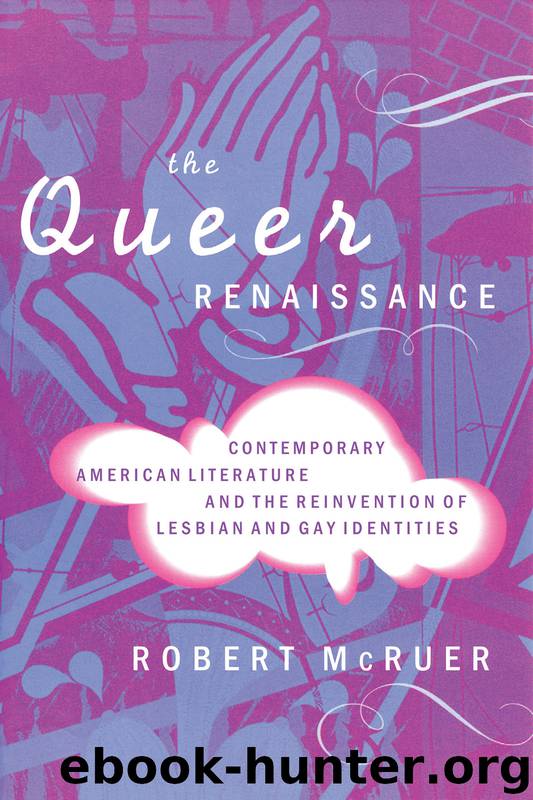The Queer Renaissance by McRuer Robert

Author:McRuer, Robert
Language: eng
Format: epub
Publisher: New York University Press
Published: 1997-03-13T16:00:00+00:00
I walk through the hole in the fence
to the other side.
Under my fingers I feel the gritty wire
rusted by 139 years
of the salty breath of the sea.
Beneath the iron sky
Mexican children kick their soccer ball across,
run after it, entering the U.S. (2)
This is not the “end of the road” for Anzaldúa; crossing the border here marks the beginning of the poet’s journey in Borderlands/La Frontera, and there is nothing very magical or transcendent about it. On the contrary: the children’s soccer ball, accidentally kicked across this border, underscores the everyday triviality of this event. At the same time, the children’s trivial “accident” contrasts ominously with the other historical “accident” that has occurred “beneath the iron sky”: the accident that produced the artificial border in the first place.
Like the soccer ball, Anzaldúa is no respecter of borders. The very text of “The Homeland, Aztlan El otro México” crosses back and forth freely between prose and poetry, between sections consisting of Anzaldúa’s “original” writing and excerpts (of prose, poetry, song) from other writers whom she has found useful and pleasurable. Her lack of respect for the border, however, is accompanied by a profound respect for the people whose lives and histories have been shaped by the border, and who have resisted, in various ways, the oppression that this accident of history has generated. This multifaceted understanding of the border, introduced in her opening poem, fuels Anzaldúa’s entire theoretical project. Her lack of respect is evident in the ease with which the poet walks across the border. Unlike Kerouac’s protagonists, her crossing is not sanctioned by hip authorities; she is not likely to gape in amazement at the “cats” who patrol the border. At the same time, even as she crosses, she reveals her awareness of how long the border has engendered both oppression and resistance: “I feel the gritty wire / rusted by 139 years / of the salty breath of the sea.”
The border and its history in this text are not picturesque; Anzaldúa uses harsh adjectives (“gritty,” “iron”) to describe the setting, and the wavelike structure of the poem itself reproduces the insistent pounding of the sea that has gouged the hole in this fence (“silver waves marbled with spume / gashing a hole under the border fence” [1]). Yet Anzaldúa’s lack of respect for the border, coupled with her simultaneous awareness of its oppressive history, leads her to yearn for something different, and she begins to identify with the harsh, insistent pounding of the ocean. She begins to look—as it were—for other holes in the fence, for ruptures in the seemingly monolithic force field that would separate her from “the other side.” In this poem, and in Anzaldúa’s theoretical project in general, mestiza queer identity comes out as one of those ruptures, and she repeatedly deploys this identity as a challenge to those who have created the border and who police it in order to maintain the division of “us” from “them.”
“I walk through the hole in the fence” suggests nothing remarkable or dreamlike about crossing the border.
Download
This site does not store any files on its server. We only index and link to content provided by other sites. Please contact the content providers to delete copyright contents if any and email us, we'll remove relevant links or contents immediately.
Come as You Are by Emily Nagoski(4466)
The Evolution of Beauty by Richard O. Prum(2997)
The Clitoral Truth: The Secret World at Your Fingertips by Rebecca Chalker(2720)
The Happy Hooker by Xaviera Hollander(2693)
The Psychology of Human Sexuality by Lehmiller Justin J(2593)
The Book of Questions: Revised and Updated by Gregory Stock Ph.d(2572)
Women on Top by Nancy Friday(2562)
The Modern Alpha Male: Authentic Principles to Become the Man You Were Born to Be: Attract Women, Win Friends, Increase Confidence, Gain Charisma, Master Leadership, and Dominate Life - Dating Advice by Patrick King(2353)
The Ultimate Guide to Anal Sex for Women by Tristan Taormino(2298)
The Coregasm Workout by Debby Herbenick(2272)
She-ology by Sherry A. Ross MD(2165)
101 Nights of Great Sex by Laura Corn(2079)
The Hite Report on Shere Hite by Shere Hite(2064)
The Ultimate Guide to Fellatio by Violet Blue(1949)
The Alchemy of Sexual Energy by Mantak Chia(1860)
A Round-Heeled Woman by Jane Juska(1845)
Orgasm mini book by Susan Bakos(1823)
The Penis Book by Aaron Spitz(1786)
Just Life & Love by A.E. Jones(1753)
